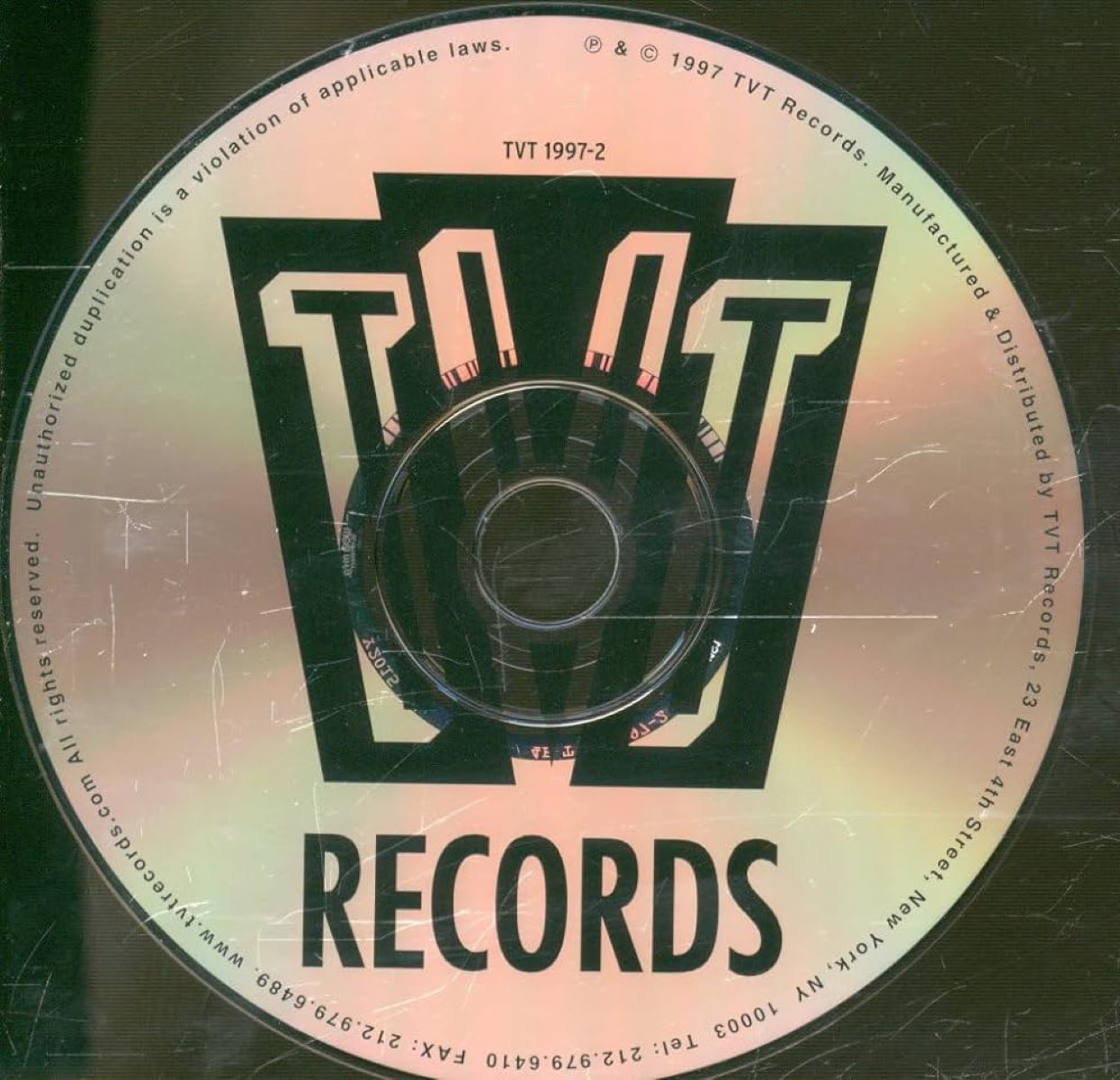Home>Production & Technology>Record Label>How To Make A Record Label


Record Label
How To Make A Record Label
Published: January 24, 2024
Learn how to start and run your own record label with our step-by-step guide. Discover the essentials of building a successful record label and making a mark in the music industry.
(Many of the links in this article redirect to a specific reviewed product. Your purchase of these products through affiliate links helps to generate commission for AudioLover.com, at no extra cost. Learn more)
Table of Contents
- Introduction
- The Basics of Starting a Record Label
- Creating Your Business Plan
- Registering Your Record Label
- Building Your Team
- Finding and Signing Artists
- Financing Your Record Label
- Marketing and Promoting Your Artists
- Producing and Distributing Music
- Building Relationships with Industry Professionals
- Managing Contracts and Royalties
- Handling Legal and Copyright Concerns
- Navigating the Digital Music Landscape
- Networking and Building a Reputation
- Expanding and Growing Your Label
- Conclusion
Introduction
Starting a record label can be an exciting and rewarding venture for music enthusiasts and entrepreneurs alike. A record label is a business entity that discovers, develops, and promotes talented artists and musicians, helping them reach a wider audience and achieve success in the music industry.
In this digital age, record labels play a crucial role in navigating the ever-changing music landscape, providing artists with the necessary support, resources, and expertise to thrive in a competitive industry. Whether you’re passionate about a specific genre of music or have a knack for scouting talent, establishing your own record label can be a fulfilling and profitable endeavor.
This comprehensive guide will walk you through the basics of starting a record label, from creating a business plan and registering your label to finding and signing artists, financing your label, marketing and promoting your artists, and more. It will provide you with valuable insights and strategies to help you build a successful record label in today’s dynamic music industry.
However, it’s important to note that starting a record label requires a significant amount of hard work, dedication, and financial investment. It’s not just about having a love for music; it’s about having a deep understanding of the industry, being persistent, and being able to adapt to changing trends and technologies. By following the steps outlined in this guide, you’ll be equipped with the knowledge and tools to navigate the challenges and opportunities of running a record label.
So, if you’re ready to embark on a journey to discover and nurture musical talent, let’s dive in and explore how to make a record label that stands out in a crowded industry.
The Basics of Starting a Record Label
Before diving into the intricacies of running a record label, it’s important to understand the fundamental aspects that lay the foundation for your success. Here are the key steps involved in getting started:
- Define Your Mission and Vision: Begin by clarifying your goals and what you hope to achieve with your record label. Consider the genres of music you’re interested in, the type of artists you want to work with, and the overall image you want to project. This will help shape your brand identity and guide your decision-making process.
- Research the Market: Conduct thorough market research to identify opportunities and understand the current trends in the music industry. Analyze the demand for specific genres and subgenres of music, and identify any gaps or niches that you can target. This will help you position your record label strategically.
- Develop a Business Plan: A comprehensive business plan is essential for the success of your record label. Outline your target market, competitive landscape, marketing strategies, financial projections, and operational plans. This plan will serve as your roadmap and guide your decision-making process as your label grows.
- Secure Funding: Starting a record label requires financial investment. Determine how much capital you need to launch your label and sustain its operations in the initial stages. Explore funding options such as personal savings, loans, investors, or crowdfunding. It’s crucial to have a solid financial plan in place to support your label’s growth.
- Choose a Business Structure: Decide on the legal structure of your record label, whether it’s a sole proprietorship, partnership, Limited Liability Company (LLC), or corporation. Consult with a legal professional to understand the implications of each structure and choose the one that best suits your needs and long-term goals.
- Obtain Necessary Licenses and Permits: Research the local and national regulations governing record labels in your area, and ensure that you obtain the required licenses and permits. This may include business licenses, tax registrations, copyright permissions, and more. Compliance with legal requirements is crucial to running a legitimate record label.
- Set Up Your Office Space and Equipment: Create a physical or virtual office space where you can carry out the day-to-day operations of your label. Invest in essential equipment such as computers, music production software, audio recording equipment, and marketing tools. Creating a professional and functional work environment is essential for efficiency and productivity.
By following these basic steps, you’ll establish a solid foundation for your record label. In the next sections, we’ll delve deeper into each aspect, providing you with actionable insights and strategies to help you succeed in the competitive music industry.
Creating Your Business Plan
A well-crafted and comprehensive business plan is essential for the success of your record label. It serves as a roadmap, outlining your goals, strategies, and financial projections. Here are the key elements to include when creating your business plan:
- Executive Summary: This section provides an overview of your record label, including its mission, target market, competitive advantage, and a summary of your financial projections. It should be concise, compelling, and engaging to grab the attention of potential investors, partners, or stakeholders.
- Company Description: Describe your record label in detail, including its history, vision, and goals. Explain the genres of music you specialize in and the unique value proposition you bring to the industry. Provide an overview of your team, resources, and any existing partnerships or collaborations.
- Market Analysis: Conduct thorough research on the current state of the music industry and your target market. Identify trends, audience demographics, and areas of growth or opportunity. Analyze the competitive landscape, understanding the strengths and weaknesses of other record labels in your niche.
- Product and Service Offering: Outline the services your record label will provide, such as artist management, recording and production, promotion, distribution, and live event support. Specify how you will add value to the artists’ careers and differentiate yourself from competitors.
- Marketing and Sales Strategy: Detail your plans for promoting and marketing your label and artists. Identify your target audience and outline the channels and tactics you will use to reach them. Include strategies for building brand awareness, engaging with fans, and securing partnerships with media outlets or influencers.
- Operational Plan: Explain how your record label will operate on a day-to-day basis. Outline the roles and responsibilities of your team members, including management, A&R, marketing, and finance. Identify any external professionals or agencies you will collaborate with, such as producers, engineers, or PR firms.
- Financial Projections: Develop a realistic and detailed financial forecast for your record label. Include income statements, balance sheets, and cash flow projections for at least the first three years. Factor in revenue streams such as artist deals, merchandise sales, and live performances, as well as your expenses for production, marketing, and overhead costs.
- Risk Assessment and Mitigation: Identify potential risks and challenges that may impact your record label’s success. Develop a plan to mitigate or overcome these risks, such as market fluctuations, changing industry trends, or financial constraints. Share how you will adapt your strategies to minimize these risks.
- Exit Strategy: Although it may seem premature, it’s important to consider your exit strategy for the future. Outline possible scenarios for selling or transitioning your label, should that become a goal down the line. This demonstrates a forward-thinking mindset and can provide reassurance to potential investors or partners.
Remember, your business plan is not set in stone and should be revisited and updated as your record label evolves. It serves as a living document that allows you to stay focused, make informed decisions, and measure your progress against your initial goals. With a well-crafted business plan, you will have a clear roadmap to guide you on your journey towards building a successful record label.
Registering Your Record Label
Registering your record label is a crucial step towards establishing it as a legitimate business entity. Here are the key considerations and steps involved in the registration process:
- Choose a Name: Select a unique and compelling name for your record label. Take the time to research existing record labels and trademarks to ensure that your chosen name is not already in use. Consider consulting with a trademark attorney to protect your brand identity.
- Determine your Legal Structure: Decide on the legal structure for your record label, such as a sole proprietorship, partnership, LLC, or corporation. Each structure has different implications for taxes, liability, and ownership. Consult with a legal professional to determine the best option for your specific needs.
- Register with the Government: Visit your local government’s business registration office or website to register your record label. Provide the necessary information, including your chosen name, legal structure, address, and contact details. Pay any required fees associated with the registration process.
- Apply for Tax Identification Numbers: Depending on your country and local tax regulations, you may need to obtain a tax identification number or employer identification number (EIN). These numbers are used for tax reporting and identification purposes. Consult with a tax professional or visit your local tax authority’s website to understand the requirements and application process.
- Obtain Licenses and Permits: Research and obtain any required licenses and permits specific to the music industry and your location. This may include performance licenses, public performance rights, music publishing licenses, and more. Compliance with these legal requirements is essential to operate legally and avoid potential fines or legal issues.
- Establish Business Bank Accounts: Open dedicated business bank accounts for your record label. This will help separate your personal finances from your label’s finances, making accounting and financial management easier. Research different banking options and choose the one that offers the best features and benefits for your specific needs.
- Create Contracts and Agreements: Develop contracts and agreements that will govern your relationships with artists, producers, songwriters, and other industry professionals. These contracts should outline the rights, obligations, and compensation details for each party involved. It’s recommended to work with a legal professional with experience in the music industry to ensure the contracts are fair and legally binding.
- Protect Your Intellectual Property: Consider registering your record label’s name, logo, and other branding elements as trademarks to protect your intellectual property. Consult with a trademark attorney to understand the process and requirements for trademark registration in your jurisdiction.
Remember, the registration process may vary depending on your location and the specific legal requirements of your country. It’s important to do thorough research or consult with legal professionals to ensure you meet all the necessary obligations. By registering your record label properly, you establish credibility, protect your rights, and set yourself up for success in the music industry.
Building Your Team
Building a talented and dedicated team is essential for the success of your record label. Assembling the right individuals with the right skills and expertise will help you effectively manage artists, promote music, and navigate the complex music industry landscape. Here are some key considerations when building your team:
- Identify Key Roles: Determine the key roles and positions required to run your record label efficiently. This may include a label manager, A&R (Artists and Repertoire) person, marketing manager, promotion manager, publicist, accountant, and legal advisor. Identify the specific skill sets and expertise required for each role.
- Hire Experienced Professionals: Seek out professionals with experience in the music industry who can bring valuable insights, connections, and industry knowledge to your team. Look for individuals who have a track record of success, understand the dynamics of the music business, and can contribute to the growth and development of your record label.
- Collaborate with Creative Artists: Forge partnerships and collaborations with talented musicians, producers, songwriters, and other creative professionals. These collaborators bring fresh ideas and artistic vision to your record label, helping you discover and nurture exceptional talent.
- Network with Industry Professionals: Attend industry events, conferences, and music festivals to network with record executives, music producers, booking agents, and other professionals in the music industry. Building strong relationships and a network of connections can open doors for collaborations, partnerships, and business opportunities.
- Delegate Responsibilities: Delegate tasks and responsibilities to team members based on their expertise and strengths. Encourage collaboration and effective communication within the team to ensure smooth operations and efficient workflow. Assign clear roles and responsibilities to avoid confusion and promote accountability.
- Educate and Train Your Team: Provide ongoing training and professional development opportunities to your team members. The music industry is ever-evolving, so it’s important to stay updated on industry trends, new technologies, and best practices. Organize workshops, seminars, or online courses to enhance your team’s skills and knowledge.
- Cultivate a Positive Work Culture: Foster a supportive and positive work environment that encourages creativity, collaboration, and mutual respect. Recognize and reward achievements, and provide opportunities for personal and professional growth. A happy and motivated team is more likely to produce exceptional work and contribute to the long-term success of your record label.
- Consider Outsourcing: Depending on your budget and needs, you may consider outsourcing certain tasks or hiring freelancers for specific projects. This can be a cost-effective solution, allowing you to access specialized expertise without incurring the commitment of a full-time hire.
Remember, building a strong and cohesive team takes time and effort. It’s important to find individuals who share your passion for music, align with your label’s vision, and complement each other’s skills. By assembling a talented and dedicated team, you’ll be well-equipped to face the challenges of the music industry and maximize the potential for success.
Finding and Signing Artists
One of the core functions of a record label is to discover and sign talented artists who have the potential to thrive in the music industry. Finding and signing the right artists is a critical step in building a successful record label. Here are some key strategies to help you in this process:
- Define Your Artist Criteria: Clearly define the type of artists you’re looking to sign. Consider factors such as genre, style, uniqueness, and marketability. Identify the specific qualities and characteristics that align with your label’s vision and target audience.
- Scout Local Music Scenes: Attend local music events, open mic nights, and small gigs to discover emerging talent in your area. Engage with musicians, listen to live performances, and network with industry professionals who can provide valuable referrals. Local scenes often produce hidden gems waiting to be discovered.
- Utilize Online Platforms: Explore music platforms such as SoundCloud, Bandcamp, and YouTube to discover independent artists who are gaining traction online. Use search filters and recommended playlists to find artists that align with your label’s musical direction. Connect with artists directly through these platforms or reach out through their social media channels.
- Collaborate with Music Industry Professionals: Network with music producers, managers, agents, and other industry professionals who have their finger on the pulse of new talent. Attend industry events, conferences, and showcases to connect with these individuals and discuss potential collaborations or artist referrals.
- Host Auditions or Contests: Organize auditions or talent contests to actively seek out artists who align with your label’s vision. Advertise the auditions through social media, local media outlets, and industry publications. This approach allows you to see artists perform live and evaluate their stage presence, vocal ability, or instrumental skills.
- Establish Artist Development Programs: Offer artist development programs that provide guidance, mentorship, and resources to up-and-coming musicians. This can attract talented artists who are seeking support and opportunities to grow in their careers. Develop a reputation as a label that invests in artist development, which can be an attractive selling point for potential signings.
- Build Relationships with A&R Representatives: Connect with A&R representatives from other record labels or music industry organizations. These professionals are often on the lookout for new talent and can provide valuable insights or referrals. Building relationships with A&R reps can lead to potential collaborations, partnerships, or artist exchanges.
- Evaluate Artists Carefully: When considering potential signings, thoroughly evaluate artists based on their musical abilities, stage presence, image, work ethic, and long-term potential. Consider their existing fan base or social media following, as well as their willingness to collaborate and work as part of your label’s vision.
- Negotiate Fair and Favorable Contracts: Once you identify artists of interest, engage in contract negotiations that are fair to both parties. Seek legal advice to ensure that the contracts protect the interests of the artist and the label. Aim for mutually beneficial agreements that outline the rights, obligations, and compensation structure for both parties.
Finding and signing talented artists is a continuous process that requires patience, persistence, and a keen eye for potential. It’s important to build a roster of artists who align with your label’s brand and have the potential to thrive in the music industry. By utilizing various strategies and approaches, you can discover and sign artists who will be the driving force behind your record label’s success.
Financing Your Record Label
Securing adequate financing is essential to launch and sustain your record label. While starting a record label can be a capital-intensive endeavor, there are various financing options to consider. Here are some key strategies to finance your record label:
- Savings and Personal Investment: Consider utilizing your personal savings or investment to fund the initial stages of your record label. This demonstrates your commitment and passion for the venture and allows you to retain full control over the label without external investors.
- Seek Investors: If personal funding is not sufficient, explore the option of attracting outside investors who are interested in supporting your record label. Prepare a compelling business plan and pitch to showcase the potential return on investment for interested parties.
- Crowdfunding: Consider crowdfunding platforms such as Kickstarter or Indiegogo to raise funds for your record label. Develop a compelling campaign that highlights your mission, artists, and unique offerings to attract support from music enthusiasts and potential fans.
- Secure Loans: Approach banks or financial institutions for business loans to finance your record label’s operations. Prepare a solid business plan and financial projections to demonstrate your ability to repay the loan. Collateral may be required, so ensure you have a comprehensive understanding of the terms and conditions.
- Grants and Sponsorships: Research and apply for grants and sponsorships offered by government entities, businesses, and music-related organizations. These funds could be designated for supporting emerging artists, fostering the music industry, or advancing specific genres or cultural initiatives.
- Licensing and Publishing Deals: Explore opportunities to generate revenue through licensing deals and music publishing arrangements. This involves licensing your artists’ music for use in commercials, films, television shows, and other media. Such deals can provide a lucrative source of income for your label.
- Generate Revenue Streams: Develop diverse revenue streams to support your label’s financial sustainability. This may include revenue from music sales, merchandise sales, concert ticket sales of your signed artists, and royalties from music streaming platforms.
- Partnerships and Sponsorships: Seek out partnerships with brands, companies, or organizations that align with your record label’s values and target audience. These partnerships can involve financial support, marketing collaborations, or co-funded projects. Ensure that the partnerships align with your label’s brand identity.
- Cost Control and Efficiency: Implement cost-effective strategies to reduce expenses and ensure efficient management of your label’s finances. This may include outsourcing certain services, allocating resources wisely, negotiating favorable contracts, and carefully tracking financial performance.
- Revenue Sharing with Artists: Establish transparent and mutually beneficial revenue-sharing models with your signed artists. This allows you to invest in their careers while ensuring that both parties benefit from the success of their music.
It’s important to carefully assess your financial needs and explore multiple financing options to ensure a solid financial base for your record label. Consider consulting with financial advisors, music industry professionals, and legal experts to make informed decisions and develop a sustainable financial strategy for your label’s growth.
Marketing and Promoting Your Artists
Effective marketing and promotion are critical to building a successful record label and gaining visibility for your artists. With numerous artists vying for attention in the music industry, it’s essential to have a strategic marketing plan in place. Here are key strategies to market and promote your artists:
- Develop a Brand Identity: Define a cohesive brand identity for your record label that resonates with your target audience and reflects your artists’ style and music. This includes creating a compelling logo, consistent visual imagery, and a unique brand voice that sets you apart from competitors.
- Create Engaging Online Presence: Build a professional website and establish a strong presence on social media platforms such as Instagram, Twitter, Facebook, and YouTube. Regularly update these channels with engaging content, including artist interviews, behind-the-scenes footage, music videos, and sneak peeks.
- Utilize Streaming Platforms: Submit your artists’ music to popular streaming platforms like Spotify, Apple Music, and Deezer. Optimize their profiles, create playlists featuring their music, and engage with fans through regular updates. Collaborate with influential playlist curators to increase exposure and reach a wider audience.
- Engage with Fans: Foster a strong connection with your artists’ fan base through regular and meaningful interactions. Encourage artists to engage with fans on social media, respond to comments, and thank them for their support. Organize meet-and-greets, fan events, or exclusive online content to deepen the bond between fans and artists.
- Collaborate with Influencers: Collaborate with influencers, bloggers, vloggers, and other online personalities who align with your artists’ music and target audience. These collaborations can involve features, interviews, song covers, or sponsored content that introduces your artists to new audiences and expands their reach.
- Invest in Music Videos: Produce high-quality music videos for your artists’ key tracks. These videos can help captivate audiences, generate buzz, and attract attention from music industry professionals. Optimize them for sharing on social media platforms and collaborate with directors and creatives who can showcase your artists’ unique vision.
- Secure Media Coverage: Develop relationships with media outlets, music journalists, and bloggers. Pitch your artists’ stories, music releases, and events to secure features, interviews, reviews, and premieres. Leverage both traditional media channels and online publications to maximize exposure.
- Plan Live Events and Concerts: Coordinate live performances, gigs, and tours for your artists to showcase their talent and engage with fans directly. Collaborate with booking agents, venues, and event organizers to secure meaningful opportunities. Utilize local music scenes and festivals to gain wider exposure for your artists.
- Create Compelling Press Releases: Craft well-written and engaging press releases that highlight important milestones, achievements, and news related to your artists. Distribute these to relevant media outlets, journalists, and industry professionals. Maintain a clear and concise style that grabs attention and provides key information.
- Explore Sync Licensing and Brand Partnerships: Pursue opportunities for sync licensing, where your artists’ music is featured in commercials, films, TV shows, or video games. Seek partnerships with brands that align with your artists’ values and target audience. These collaborations can provide exposure, financial support, and brand credibility.
Remember, each artist is unique, and their marketing strategies should be tailored to their individual strengths and target audience. Continuously monitor and analyze the results of your marketing efforts, adapting and refining your strategies as needed. With a comprehensive marketing and promotion plan in place, you can effectively introduce your artists to the world and achieve long-term success for your record label.
Producing and Distributing Music
Producing and distributing music is at the core of a record label’s operations. It involves working closely with artists, ensuring high-quality recordings, and effectively delivering music to the audience. Here are key considerations for producing and distributing music:
- Studio Recording: Collaborate with artists to ensure the best possible studio recordings. Provide access to professional recording facilities or connect artists with trusted recording studios or producers. Work with experienced engineers to capture and enhance the artistic vision of the music.
- Creating Demo Recordings: Help artists create demo recordings to showcase their music. This allows artists to share their work with industry professionals, potential collaborators, and fans. Demo recordings are often used to generate interest, secure live performance opportunities, and attract interest from record labels and A&R representatives.
- Music Production: Guide the music production process to ensure the highest quality and artistic integrity. Collaborate with producers, sound engineers, and session musicians to shape the sound, mix, and master the recordings. Work closely with artists to maintain their artistic vision while harnessing the production expertise to enhance the overall quality of the music.
- Songwriting and Composition: Support artists in songwriting and composition by providing guidance, access to co-writers or session musicians, and resources such as recording studios or instruments. Collaborate with songwriters or connect artists to established songwriting professionals to further enhance the quality of their compositions.
- Music Distribution and Digital Platforms: Utilize digital music distribution platforms such as CD Baby, TuneCore, or DistroKid to distribute your artists’ music to major streaming services, online retailers, and social media platforms. Ensure that your artists’ music is available to a wide audience and accessible on popular platforms where fans consume music.
- Physical Distribution: If there is demand for physical copies of music, coordinate the production and distribution of CDs, vinyl records, or merchandise. Collaborate with manufacturers, distributors, and retailers to ensure that physical products are available to fans through both online and offline channels.
- Streaming Strategies: Develop strategies to maximize streaming revenue for your artists. This includes playlist outreach, collaborative partnerships, and engaging with influential curators or influencers. Analyze streaming data to identify trends, target demographics, and optimize promotional efforts.
- Mixtapes and EP releases: Consider releasing mixtapes or EPs to showcase your artists’ talent and build buzz around their music. These shorter releases can serve as a stepping stone to larger album releases and help create a loyal fan base.
- Licensing and Sync Opportunities: Explore licensing and synchronization opportunities for your artists’ music. This involves placing their songs in commercials, films, TV shows, video games, or other media. Work with music supervisors, licensing agencies, and industry connections to secure these opportunities and expand the reach of your artists’ music.
- Collaborations and Remixes: Encourage collaborations between your artists and other musicians or producers. This can help broaden their exposure and introduce them to new audiences. Additionally, consider commissioning remixes of your artists’ songs to give their music a fresh perspective and appeal to different genres or fan bases.
- Marketing Campaigns: Coordinate marketing campaigns specific to music releases, leveraging social media, press releases, influencers, and targeted advertising to generate awareness and anticipation. Develop unique selling points or special editions to incentivize fans to engage with and purchase the music.
Effective production and distribution of music play a crucial role in the success of your record label. By ensuring high-quality recordings, utilizing digital distribution platforms, exploring licensing opportunities, and implementing creative marketing campaigns, you can effectively introduce your artists’ music to the world and help them reach a larger audience.
Building Relationships with Industry Professionals
Building strong relationships with industry professionals is vital for the growth and success of your record label. Cultivating connections with key players in the music industry can open doors to collaboration, support, and valuable opportunities for your artists. Here are key strategies to build relationships with industry professionals:
- Attend Industry Events: Attend music conferences, festivals, and networking events to meet and connect with industry professionals. These events provide opportunities to engage in conversations, exchange ideas, and build rapport with individuals from record labels, management companies, booking agencies, and other industry sectors.
- Research and Identify Key Influencers: Identify industry influencers who align with your label’s genre or style. These can include music journalists, bloggers, playlist curators, DJs, radio hosts, and music supervisors. Engage with their content, share their work, and build authentic relationships by providing value and support.
- Network and Collaborate: Network with industry professionals through social media platforms, forums, and professional associations. Initiate conversations, offer assistance, and seek opportunities for collaboration. Cultivate genuine connections by finding common ground and demonstrating a commitment to mutually beneficial relationships.
- Utilize A&R Representatives: Connect with A&R representatives from other record labels or music industry organizations. These professionals are constantly on the lookout for talented artists and potential collaborations. Building relationships with A&R reps can open doors to partnership opportunities or artist exchanges.
- Establish Artist Development Programs: Develop artist development programs that offer guidance, resources, and networking opportunities for emerging artists. Involve industry professionals as mentors, guest speakers, or consultants to provide valuable insights and expertise.
- Collaborate with Music Producers and Engineers: Form relationships with music producers, engineers, and studio professionals who share your passion for music and have a proven track record of successful projects. These collaborations can enhance the production quality of your artists’ music and bring valuable industry connections.
- Engage with Music Publishers and Licensing Professionals: Connect with music publishers and licensing professionals who can help your artists secure publishing deals, sync licensing opportunities, or placements in commercials, films, or TV shows. Collaborate with them to explore ways to maximize the exposure and revenue potential of your artists’ music.
- Maintain Relationships with Booking Agents: Cultivate relationships with booking agents who can secure live performance opportunities for your artists. Building a strong rapport with booking agents increases the likelihood of your artists performing at festivals, venues, and other live events, ultimately growing their fan base and visibility.
- Work with Publicists and PR Professionals: Collaborate with publicists and PR professionals who specialize in the music industry. These experts can help generate media coverage, secure interviews, and create strategic publicity campaigns to raise awareness about your artists and their music.
- Provide Value and Support: Offer assistance, advice, and support to industry professionals whenever possible, even if it doesn’t immediately benefit your record label. Building a reputation for being helpful and reliable can lead to fruitful relationships and reciprocity in the future.
- Maintain Professionalism and Authenticity: When engaging with industry professionals, be professional, respectful, and genuine. Demonstrate your passion for music, honesty, and a long-term commitment to building meaningful connections. Avoid being overly sales-oriented and focus on building mutually beneficial relationships based on trust and shared values.
Remember, building relationships with industry professionals is an ongoing process that requires consistent effort and genuine engagement. Nurture these connections by staying in touch, providing updates on your artists’ progress, and continuing to collaborate on projects whenever feasible. By building a strong network of industry professionals, you can position your record label and artists for long-term success in the music industry.
Managing Contracts and Royalties
Effective management of contracts and royalties is crucial for a record label to ensure fair and transparent agreements with artists and to maximize revenue streams. Here are key considerations for managing contracts and royalties:
- Clear and Comprehensive Contracts: Work with legal professionals experienced in the music industry to draft clear and comprehensive contracts for your artists. These contracts should outline the rights, obligations, and compensation structure for both the artist and the record label. Ensure that all parties involved have a thorough understanding of the contract terms before signing.
- Artist Royalty Structures: Establish royalty structures that are fair and transparent for your artists. Define the percentage of revenue they are entitled to from music sales, streaming, merchandise, and other income streams. Clearly communicate the terms and conditions related to royalties, including accounting timelines, audit rights, and dispute resolution.
- Royalty Tracking and Accounting Systems: Implement robust royalty tracking and accounting systems to accurately calculate and allocate royalties to your artists. Utilize specialized software or work with royalty accounting firms to ensure precise and transparent reporting. Regularly communicate with artists about their royalty income and provide detailed statements to maintain trust and transparency.
- Publishing and Mechanical Royalties: Understand the intricacies of publishing and mechanical royalties. Ensure that appropriate rights are secured for the use of artists’ compositions, including rights for reproduction and distribution. Register the songs with relevant performing rights organizations and collect publishing royalties to maximize revenue for both the artist and the label.
- Collecting and Distributing Royalties: Establish efficient systems for collecting and distributing royalties to your artists. Stay updated on the latest royalty collection methods and work with collection societies or agencies to streamline the process. Promptly distribute the artists’ share of royalties based on the agreed-upon timeline outlined in the contracts.
- Transparency in Financial Reporting: Provide transparency in financial reporting to artists by regularly sharing detailed statements that clearly show revenue streams, deductions, and calculations related to royalties. Consider providing access to an online portal where artists can track their earnings and view real-time updates on their royalty income.
- Auditing and Dispute Resolution: Establish guidelines for auditing royalty statements if there are concerns or discrepancies. Artists should have the opportunity to audit the record label’s accounting records to ensure accuracy. Implement an effective dispute resolution process to address any disagreements or discrepancies that may arise.
- Stay Updated on Copyright Laws: Keep abreast of copyright laws, licensing regulations, and changes in the music industry’s legal landscape. This ensures that you are compliant with copyright requirements, properly protect your artists’ intellectual property, and maximize revenue by capitalizing on licensing and synchronization opportunities.
- Collaboration and Communication: Foster open communication and collaboration with artists regarding their contracts and royalties. Address any questions or concerns promptly and seek to maintain a positive and mutually beneficial working relationship. Regularly review and renegotiate contracts when necessary to reflect the evolving needs of artists and the label.
Effective management of contracts and royalties is vital for a record label’s success. By establishing clear and fair agreements, implementing efficient royalty tracking and accounting systems, and maintaining transparent and trustworthy communication with artists, you can build strong relationships, protect their rights, and maximize revenue streams for both the artists and the label.
Handling Legal and Copyright Concerns
Managing legal and copyright concerns is of utmost importance for a record label to operate ethically, protect intellectual property, and avoid legal disputes. Here are key considerations for handling legal and copyright concerns:
- Consult with Legal Professionals: Work closely with legal professionals specializing in the music industry to ensure compliance with applicable laws and regulations. Seek their guidance in drafting and reviewing contracts, resolving disputes, navigating licensing agreements, and addressing any legal concerns that may arise.
- Understand Copyright Laws: Develop a thorough understanding of copyright laws relevant to the music industry. This includes knowledge of the rights granted to copyright holders, deadlines for registration, duration of copyright protection, and fair use guidelines. Stay updated on changes in copyright legislation to protect your artists’ intellectual property rights.
- Secure Licensing and Permissions: Obtain the necessary licenses and permissions for the use of copyrighted material, including compositions, samples, and recordings. This ensures compliance with copyright laws, avoids legal disputes, and protects your label and artists from potential lawsuits or penalties.
- Register Copyrights: Encourage artists to register their works with the appropriate copyright authorities. Registering copyrights provides additional legal protection and helps establish a clear record of ownership. Support artists in the copyright registration process, including the registration of compositions, sound recordings, and any other creative content they produce.
- Protect Trademarks and Branding: Safeguard your record label’s trademarks, logos, and branding elements by registering them with the appropriate trademark authorities. Protecting your brand identity helps prevent unauthorized use or confusion with other entities in the industry. Monitor and enforce your trademarks to maintain exclusivity and protect your label’s reputation.
- Monitor and Manage Digital Rights: Ensure that your artists’ music is not being illegally distributed or used without permission on digital platforms. Utilize copyright protection services and digital rights management tools to monitor and control the unauthorized use of your artists’ works. Respond promptly to any infringement issues or copyright violations that you become aware of.
- Stay Compliant with Licensing Requirements: Comply with relevant licensing requirements for public performances, broadcasts, streaming, and reproduction rights. Work with performance rights organizations (PROs) and other licensing bodies to ensure that your artists’ music is properly licensed, and royalties are collected and distributed appropriately.
- Educate Artists and Staff: Provide education and training to artists and staff members regarding legal and copyright matters. Ensure that they understand the importance of protecting intellectual property, the implications of infringement, and their rights and responsibilities. This empowers them to make informed decisions and avoid unnecessary legal complications.
- Cultivate Respect for Intellectual Property: Foster a culture within your label that respects intellectual property rights. Encourage artists and staff members to seek permission and properly credit the creators when using copyrighted material in their work. Lead by example and demonstrate zero tolerance for piracy or infringement.
- Monitor Legal and Copyright Developments: Stay informed about changes and developments in copyright law, licensing regulations, and intellectual property rights through industry publications, legal updates, and professional networks. Adapt your practices and policies accordingly to ensure ongoing compliance with the law.
Handling legal and copyright concerns with diligence and care is essential for the long-term success and sustainability of a record label. By working closely with legal professionals, staying informed about copyright laws, securing proper licenses, and promoting a culture of respect for intellectual property, you can protect your artists’ works, mitigate legal risks, and operate within the parameters of the law.
Navigating the Digital Music Landscape
In today’s music industry, the digital landscape plays a crucial role in the discovery, distribution, and promotion of music. Navigating this ever-evolving digital landscape is essential for record labels to succeed. Here are key strategies for navigating the digital music landscape:
- Embrace Streaming Platforms: Leverage the power of streaming platforms such as Spotify, Apple Music, and Amazon Music to make your artists’ music accessible to a wide audience. Optimize their profiles, curate playlists, and engage with fans to generate streaming revenue and increase visibility.
- Utilize Social Media Marketing: Maximize your presence on social media platforms such as Instagram, Twitter, Facebook, and TikTok. Create engaging content, interact with fans, run targeted advertising campaigns, and collaborate with influencers to expand your artists’ reach and promote their music to a global audience.
- Grow a YouTube Presence: YouTube is a powerful platform for music discovery. Create visually compelling music videos, live performances, and behind-the-scenes content to engage fans and attract new listeners. Optimize your artists’ YouTube channels, collaborate with popular channels, and utilize YouTube’s monetization features.
- Harness the Power of Data and Analytics: Utilize data and analytics to understand your artists’ audience demographics, streaming patterns, and engagement metrics. Analyze this information to make informed decisions about marketing strategies, tour planning, and content creation. Use insights to identify target markets and tailor promotional efforts accordingly.
- Engage with Independent Music Blogs and Playlists: Reach out to independent music blogs and playlists that cater to your artists’ genre or style. Submit their music for features, reviews, or playlist placements. These outlets often have dedicated followings and can help increase exposure and attract new fans.
- Explore Influencer Collaborations: Collaborate with social media influencers, vloggers, or content creators who align with your artists’ style and target audience. Engage in sponsored content collaborations, giveaways, or artist takeovers to leverage their reach and introduce your artists to new fan bases.
- Develop a Strong Website and Email List: Create a professional website for your label and individual artist websites. Optimize them for search engines and make them user-friendly. Build an email list to directly connect with fans and provide updates on new music releases, tours, and exclusive content. Use the website and email list to convert casual listeners into dedicated supporters.
- Utilize Music Discovery Platforms: Make use of platforms dedicated to music discovery, such as SoundCloud, Bandcamp, and Audiomack. These platforms allow artists to showcase their music to a niche audience and attract dedicated followers who appreciate independent and emerging talent.
- Stay Abreast of Technology Trends: Keep up with trends and advancements in music technology, such as virtual reality, live streaming, augmented reality, and blockchain-based platforms. Embrace technological innovations that enhance music creation, fan engagement, and the distribution of music.
- Collaborate with Digital Marketing Experts: Consider working with digital marketing experts who specialize in the music industry and understand the nuances of the digital landscape. These professionals can help you develop effective strategies, improve visibility, and drive engagement with your artists’ music.
Navigating the digital music landscape requires adaptability, staying informed, and embracing new platforms and technologies. By embracing streaming, engaging on social media, utilizing data and analytics, and leveraging digital marketing strategies, you can capitalize on the digital landscape to promote your artists’ music, enhance discoverability, and connect with a global audience.
Networking and Building a Reputation
Networking and building a strong reputation are essential for success in the music industry. Effective networking allows you to connect with industry professionals, establish valuable relationships, and create opportunities for your record label and artists. Here are key strategies for networking and building a reputation:
- Attend Industry Events and Conferences: Attend music industry events, conferences, and seminars to connect with like-minded professionals. These gatherings provide opportunities to network, share knowledge, and stay updated on industry trends. Engage in conversations, exchange contacts, and seek out potential collaborators, mentors, or supporters.
- Join Professional Associations and Organizations: Become a member of music industry associations, organizations, and societies. These groups offer networking events, educational resources, and access to industry databases. Engaging with these communities connects you with fellow professionals and provides a platform to share insights and opportunities.
- Utilize Online Platforms: Participate in online forums, blogs, and social media groups focused on the music industry. Engage in discussions, offer valuable insights, and connect with individuals who share your passion. Online platforms provide avenues for networking, discovering talent, and building a strong industry presence.
- Become an Active Supporter of Local Music Scenes: Engage with and support the local music scenes in your area. Attend live performances, connect with local artists, and partner with local promoters or venues. Building a strong presence within your local music community enhances your reputation as a supportive and engaged label.
- Collaborate with Other Industry Professionals: Seek opportunities for collaboration with other record labels, management companies, booking agencies, and promotion companies. Collaborative projects allow you to tap into their networks, share resources, and exchange expertise, expanding your reach and influence within the industry.
- Support Emerging Artists: Show support for emerging artists by attending their shows, sharing their music on social media, and offering guidance or mentorship. Nurturing relationships with emerging talent can lead to long-lasting connections and potential collaborations as their careers progress.
- Provide Value to Others: Be proactive in offering support and expertise to others in the industry. Share resources, introduce contacts, and provide guidance when possible. Demonstrating a genuine commitment to helping others fosters goodwill and strengthens your reputation as a reliable and supportive industry professional.
- Maintain Professionalism and Integrity: Conduct yourself with professionalism, integrity, and honesty in all your interactions. Be reliable, deliver on promises, and adhere to ethical standards. Building a reputation as a trustworthy and reliable industry player enhances your credibility and opens doors for future collaborations and partnerships.
- Showcase Success Stories: Highlight success stories of your artists and the achievements of your record label. Share these stories on your website, social media platforms, and press releases. Demonstrating a track record of successful talent development and promotion enhances your reputation and attracts more artists and industry professionals to engage with your label.
- Seek Industry Recognition and Awards: Pursue opportunities for industry recognition and awards. Submit your artists’ work for consideration in prestigious awards programs, industry showcases, and talent competitions. Recognition from respected industry organizations and awards can significantly boost your label’s reputation and attract industry attention.
Networking and building a strong reputation require consistent effort, genuine engagement, and a commitment to supporting others in the industry. By attending industry events, leveraging online platforms, collaborating with industry professionals, supporting local music scenes, and conducting yourself with professionalism, you can establish a strong industry presence and position your record label as a respected player in the music industry.
Expanding and Growing Your Label
Expanding and growing your record label is an exciting phase that requires strategic planning, adaptability, and a focus on maximizing opportunities. Here are key strategies to expand and grow your record label:
- Constantly Evaluate and Evolve: Continuously assess your label’s performance, market trends, and industry changes. Stay updated on emerging genres, new technologies, and shifts in consumer preferences. Adapt your strategies, business model, and artist roster as needed to remain relevant and capitalize on new opportunities.
- Scale Your Operations: As your record label grows, evaluate and refine your operational processes. Streamline workflows, invest in scalable technologies, and expand your team strategically. Enhance efficiency while maintaining the quality and personalized approach that sets your label apart.
- Diversify Your Artist Roster: Expand your artist roster by signing artists from a variety of genres and styles. This diversification allows you to appeal to a broader audience and tap into different market segments. Embrace emerging genres and support artists who bring a unique and fresh perspective to the music industry.
- Explore International Markets: Consider expanding your label’s reach by exploring opportunities in international markets. Sign artists from different countries, seek partnerships with local labels or promoters, and leverage online platforms to connect with international audiences. Tailor your marketing and promotion efforts to target specific regional markets.
- Create Strategic Partnerships: Forge strategic partnerships with other industry players, such as record labels, management companies, booking agencies, and music publishers. Collaborations can help expand your network, share resources, access new markets, and amplify your artists’ reach. Develop mutually beneficial partnerships that align with your label’s vision and values.
- Invest in Artist Development: Continue to invest in the development of your artists’ careers. Provide resources, mentorship, and guidance to help artists refine their skills, expand their fan base, and reach new milestones. By nurturing and supporting your artists, you build a reputation as a label that fosters long-term success.
- Strengthen Brand Partnerships: Cultivate brand partnerships that align with your label’s values and target audience. Collaborate on marketing campaigns, sponsorships, or exclusive content releases. These strategic alliances not only provide financial support but also contribute to your label’s visibility and create new avenues for promotion.
- Expand Revenue Streams: Explore creative ways to diversify your revenue streams beyond traditional music sales. This could include merchandise sales, licensing opportunities, sync placements, artist endorsements, live events, branded collaborations, and crowdfunding campaigns. Stay open to innovative revenue models while considering the long-term sustainability of your label.
- Embrace Emerging Technologies: Keep an eye on emerging technologies that present new opportunities for the music industry. Stay updated on developments in virtual reality, augmented reality, livestreaming, blockchain, and AI. Embrace these technologies to enhance fan experiences, engage with audiences, and create innovative marketing campaigns for your artists.
- Build a Global Distribution Network: Expand your label’s distribution network to reach new markets worldwide. Work with reputable distributors or explore direct partnerships with streaming platforms and retailers. Develop relationships with global playlist curators, local influencers, and international media outlets to build awareness and attract international audiences.
- Invest in Marketing and Promotion: Allocate resources to strategic marketing and promotion campaigns. Whether through digital marketing, PR initiatives, tour support, or innovative viral campaigns, invest in activities that create buzz and generate exposure for your artists. Develop a strong online presence, engage with fans, and leverage data-driven insights to target specific audiences effectively.
Expanding and growing your record label requires careful planning, adaptability, and a willingness to embrace new opportunities. By evaluating market trends, scaling your operations, diversifying your artist roster, forging strategic partnerships, and exploring emerging technologies, you can position your label for continued growth, success, and influence in the dynamic music industry.
Conclusion
Building and running a successful record label requires passion, resilience, and a deep understanding of the ever-evolving music industry landscape. As you embark on this exciting journey, keep in mind the key elements and strategies outlined in this comprehensive guide.
From defining your mission and vision to navigating legal and copyright concerns, each aspect of starting and growing your record label plays a crucial role in your success. It is essential to establish a strong brand identity, build a talented and dedicated team, and forge relationships with industry professionals who can support your journey.
Managing contracts, royalties, and financials with transparency and efficiency is vital to maintain trust with your artists and ensure the smooth operation of your label. Embracing the digital music landscape, utilizing streaming platforms, and harnessing the power of social media and digital marketing tools will help you amplify your artists’ visibility and connect with a global audience.
Continuously adapt to changes in the industry, explore new opportunities, and diversify your revenue streams to sustain growth and maximize your label’s potential. By investing in artist development, cultivating strategic partnerships, and staying ahead of emerging technologies, you can position your label for continued success and influence.
Remember, building a record label is a journey that requires dedication, adaptability, and a commitment to the growth and success of your artists. Uphold the values of integrity, professionalism, and genuine support for your roster, and always prioritize the artistic vision and well-being of your artists.
With the information and strategies outlined in this guide, you are equipped to navigate the complexities of the music industry, foster the growth of your record label, and make a meaningful impact in the world of music. Embrace the challenges, celebrate the victories, and never lose sight of your passion for music and the artists who make it all possible.











